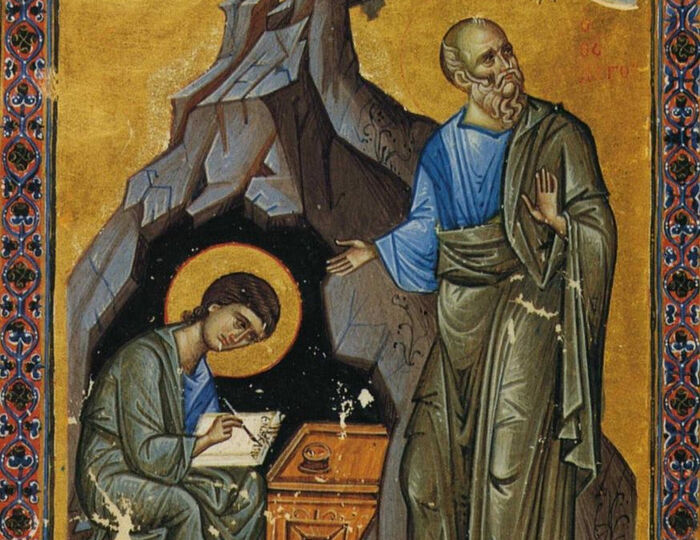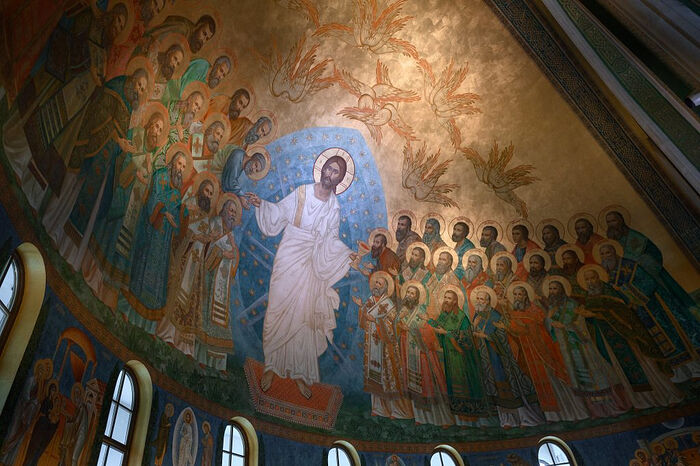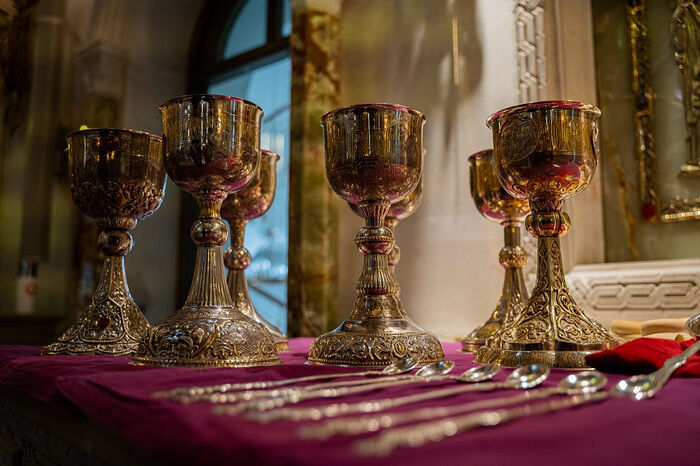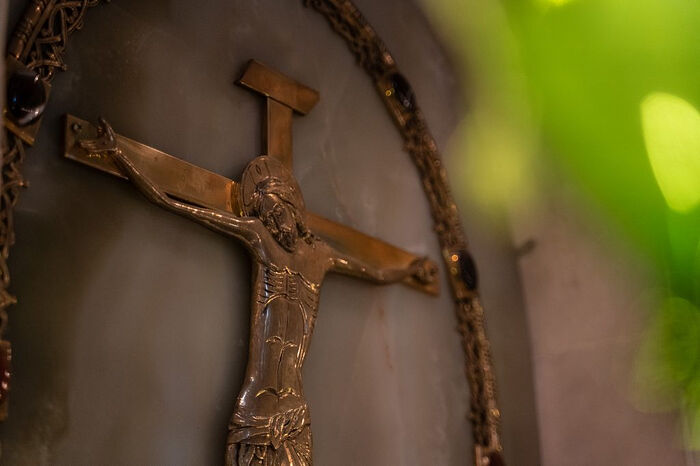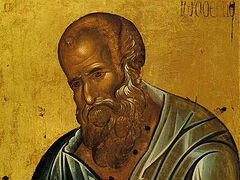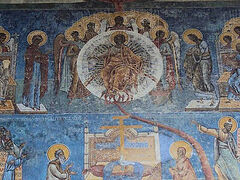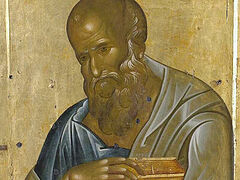Talk 8. Christians—the Royal Priesthood.
Today we will finish reading St. John the Theologian’s greeting to the seven Churches which are in Asia (Rev. 1:4).
At the end of the greeting, St. John praises Christ: Unto Him that loved us, and washed us from our sins in His own blood, And hath made us kings and priests unto God and His Father; to Him be glory and dominion for ever and ever. Amen (Rev. 1:5-6).
Thus, Christ has made us “kings.” What does that mean? Let’s talk about our royal status and its fulfillment in the Church.
The fallen king
Man received royal authority from God at his creation. God, “the King of kings,” created Adam in His own image. Man bears within himself the image of Him Who has power and authority. Man is given the authority to replenish the earth, and subdue it: and have dominion over the fish of the sea, and over the fowl of the air, and over every living thing that moveth upon the earth (Gen. 1:27-28). Man is king of the earthly world. Everything is created for him.
But after the Fall, he became a fallen king. The fall of man is firstly the loss of his royalty. And instead of being the king of creation, he becomes its slave. In the Fall, Adam renounces the authority given him from above; he renounces his “anointing.” He is no longer the benefactor of creation. Instead of leading the world to perfection through his personal growth in God, man now wants to receive earthly goods from creation, to own it for himself. But neither he nor creation has life within itself—and with the Fall of man, death reigns. Adam becomes a mortal slave of the kingdom of death.
Christ accomplishes the atonement of man as King. In Christ, the true nature of man is restored and his royal status is returned to him. This theme requires some explanation.
The Divine and human kingship of Christ
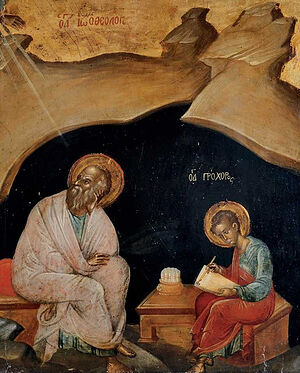 The Gospel repeatedly emphasizes the royal dignity of Christ. During His entrance into Jerusalem, He is greeted as the King that cometh in the name of the Lord (Lk. 19:38). There is also Christ’s answer before Pilate: Thou sayest that I am a king (Jn. 18:37). As we read these passages, we tend to attribute the kingship of Christ to His Divine nature. But the kingship of Christ is not just His Divine, but also His human dignity. All power is given unto Me in Heaven and in earth (Mt. 28:18), He says about His deified human nature first of all. “This must be understood in reference to human nature (the God-Man); because the authority that He had from eternity as God, and the power and glory and the Heavenly height and dignity, He now receives as Man,” says St. Gregory Palamas, interpreting these words of Christ.
The Gospel repeatedly emphasizes the royal dignity of Christ. During His entrance into Jerusalem, He is greeted as the King that cometh in the name of the Lord (Lk. 19:38). There is also Christ’s answer before Pilate: Thou sayest that I am a king (Jn. 18:37). As we read these passages, we tend to attribute the kingship of Christ to His Divine nature. But the kingship of Christ is not just His Divine, but also His human dignity. All power is given unto Me in Heaven and in earth (Mt. 28:18), He says about His deified human nature first of all. “This must be understood in reference to human nature (the God-Man); because the authority that He had from eternity as God, and the power and glory and the Heavenly height and dignity, He now receives as Man,” says St. Gregory Palamas, interpreting these words of Christ.
In the Resurrection of Christ, human nature receives the royal dignity it lost in the Fall. Christ is the King, the New Adam, the perfect man. He restores human nature in Himself to that glory, power, and kingship to which the Lord calls it.
But how can we unite ourselves to this kingship? In the Sacraments of Baptism and Chrismation. In giving a man new birth, they recreate him as a king. We are anointed for kingship, as kings once were.
An important remark: The royal anointing makes us spiritual kings, but that kingship that Christ gives us is a crucified kingship—that of the Cross. Christ’s crowning as King—is the Cross. And the only path for us to be crowned together with Him, for the restoration of our royal dignity—is to take up our cross and follow after Christ.
This is the subjective side that depends on us. There are objective and subjective sides to our salvation and our spiritual reign. The objective side is realized by the Holy Spirit, Whom we receive in Chrismation. And the subjective depends on our effort—on how much we love the Kingdom prepared for us and will live according to its laws.
But our Kingdom is not of this world! And our King, Who made us kings, is the Crucified King. It is precisely Christ’s death on the Cross that made it possible for us to receive the Holy Spirit, by Whose action we become kings and priests. St. John the Theologian’s words about the royal dignity are also connected with the theme of the Cross: Unto Him that loved us, and washed us from our sins in His own blood, And hath made us kings and priests unto God and His Father; to Him be glory and dominion for ever and ever. Amen (Rev. 1:5-6). First about the Blood of Christ, then about our reign. One flows from the other.
The most accurate definition of our royal dignity, restored to us by the royal anointing, is the words of the Apostle Paul: The world is crucified unto me, and I unto the world (Gal. 6:14).
Our reign over sin, demons, and the devil
Our royal dignity also consists in reigning over sin, demons, and the devil—by the power of Christ. We must overcome sin with Christ’s help. The devil and the demons have already been defeated by Christ—but they are allowed to work on us for the sake of our humility, self-knowledge, and the activation of our power and will. From Christ we have the power and authority to overcome them. We receive this power in the Sacraments.
The full realization of our kingdom and priesthood will come only in the future age. For example, it says in Rev. 5:8-10: The four beasts and four and twenty elders fell down before the Lamb, having every one of them harps, and golden vials full of odours, which are the prayers of saints. And they sung a new song, saying, Thou art worthy to take the book, and to open the seals thereof: for Thou wast slain, and hast redeemed us to God by Thy blood out of every kindred, and tongue, and people, and nation; And hast made us unto our God kings and priests: and we shall reign on the earth.
Archimandrite Iannuary (Ivliev) translates and comments precisely on this: “’Thou hast created out of them (i.e., out of all the nations) a kingdom and priests to our God, and they will reign on earth.’ This will happen only after the Second Coming of Christ.”
Royalty is power and authority
Thus, royalty is the power and authority that comes from God. We receive this spiritual power and authority in the Church. The more someone belongs to the Church, the closer he is to it, the more he has this power and authority.
Our God is the King of kings and Lord of lords (1 Tim. 6:15). We are the image of God, and that means we bear within ourselves the imprint of His royalty. And for this image, darkened within us by sin, to shine within us again, we need a Savior. He returns to us our “royal priesthood” that was once lost in sin. And the words of St. John the Theologian will come true in us according to the measure of our nearness to Him: He hath made us kings and priests unto God and His Father.
In the next article, we will talk about the seventh verse: Behold, He cometh with clouds; and every eye shall see Him, and they also which pierced Him (Rev. 1:7). To understand these words, we’ll have to delve into the Old Testament, with which the book of Revelation has many connections.
To be continued…
Sergei Komarov is a well-known Orthodox writer and catechist based in Moscow.

